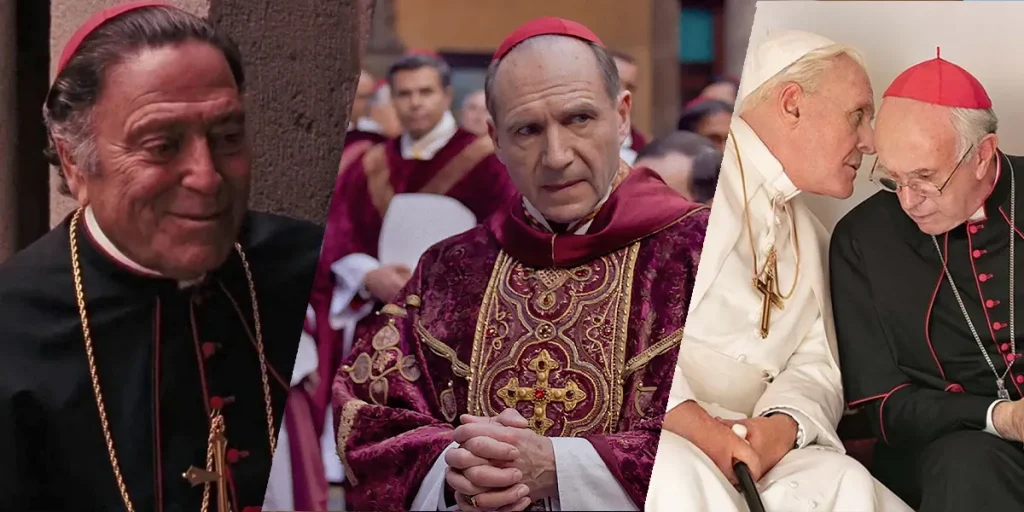What are the best movies about Popes? Here are 10 cinematic portrayals of the Holy Father on screen, including 5 that feature a conclave.
When it comes to the representation of the Pope on screen, Conclave will naturally come to mind as one of the protagonists of the 2024 award season. However, that is not the first time the Holy Father – or the conclave that elects him – is portrayed in movies, and it will most likely not be the last. While the relationship between religion and cinema is an incredibly broad topic, there is no time better than now to revisit some of the most iconic depictions of the Pope on screen. These are 10 examples of some of the best portrayals of the Pope on screen, from most to least recent release.
1. Conclave (2024)
Everyone keeps referring to Conclave lately in light of the upcoming real-life conclave we are about to witness in the next few weeks. At the beginning of the movie, the death of the late Pope prompts all the cardinals to reunite in Rome to elect the new Pope. But as the throne of the Holy Sea remains vacant for the duration of the Conclave, Cardinal Lawrence (Ralph Fiennes) will attempt to untangle a web of lies and secrets that each candidate is desperately trying to hide. But if Edward Berger’s film has taught us anything is that the papal elections are a matter of politics, ambitions, and corruption, perhaps much more than we might want to admit, but also that nothing is set in stone when it comes to the highest seat in the Vatican.
2. Kidnapped (Rapito) (2024)
Jumping back to the past, Marco Bellocchio’s Kidnapped (Rapito) features Pope Pius IX (Paolo Pierobon) as the main antagonist of the film in what many will be surprised to find out is a real story. More precisely, the film starts in 1858 when Edgardo Mortara (Leonardo Maltese) is forcibly taken from his Jewish family and brought to Rome, where the Church intends to raise him as a Catholic. The movie then spans over the rest of his life, and consequently, some of the most significant historical moments in the unification of Italy. The Pope features predominantly in both narrative strains. On the one hand, he insists on keeping Edgardo in his care, despite the growing pressures from both the Italian government and foreign ones. On the other hand, Pius IX also represents the last obstacle to the unification of Italy: the Papal State and its control of Rome.
3. The Pope’s Exorcist (2023)
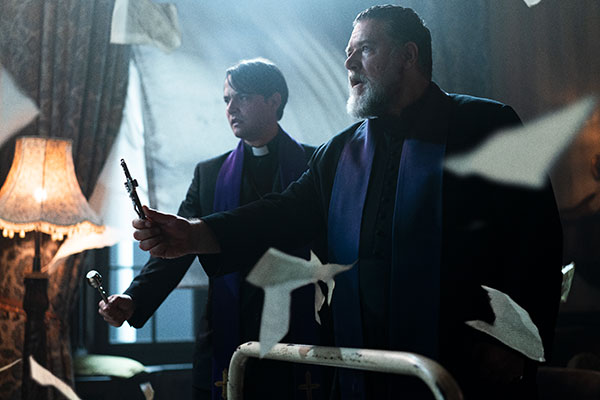
The Pope’s Exorcist focuses on the titular character, Father Gabriel Amorth (Russell Crowe), who investigates some sinister events and dark secrets when a young boy is seemingly possessed by a demon at the beginning of the film. The Pope (Franco Nero) oversees this and all of Armoth’s future assignments, proving to be heavily involved in the whole matter. While it may seem highly fictional, the film is actually based on the real story recorded by the real-life late Gabriel Amorth, who is often regarded as a highly influential and controversial figure in the Catholic Church today. Therefore, this story does have some fragments of reality in the historical role that exorcists used to play in the Vatican.
4. The Two Popes (2019)
While inspired by real events – and certainly by historical figures that many in the audience will know well – The Two Popes is a fictionalised portrayal of the encounter between Pope Benedict XVI (Anthony Hopkins) and the then-Cardinal Jorge Mario Bergoglio (Jonathan Pryce). As the former is considering abdicating the papacy, the latter is also considering his resignation as archbishop. When the two meet, they discuss what brought them to this moment and what they envision the roles of God and the Church to be. With outstanding performances and a fascinating examination of a pivotal moment in modern history, Fernando Meirelles’ film may now seem more relevant than ever now that the historical figures behind it are both dead.
5. We Have a Pope (Habemus Papam) (2011)
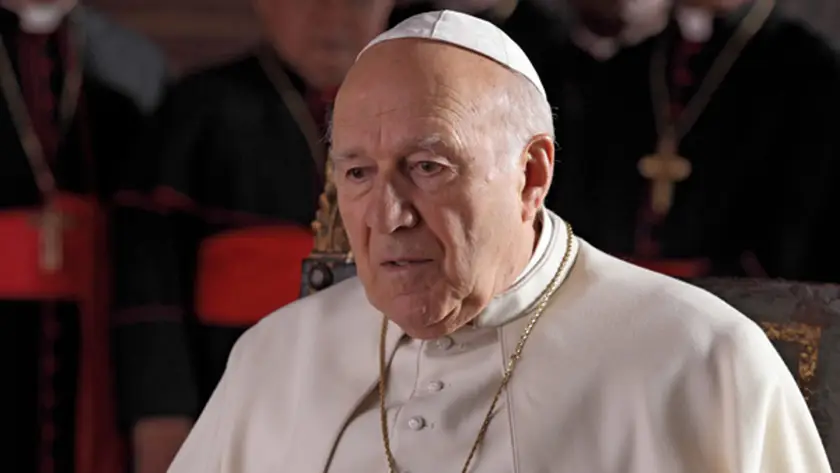
Directed by Nanni Moretti, We Have a Pope (Habemus Papam) is an Italian-French comedy drama. The title is borrowed from the Latin phrase used to announce a new Pope. It may not come as a surprise, then, that the movie tells the story of a conclave and a cardinal who is elected to the papacy against his wishes. Despite initial hesitation, his personal crisis, and a panic attack before appearing to the public, Cardinal Melville (Michel Piccoli) has been chosen as the Pope, but will he manage to accept this and appear before the outside world? This movie adds an element of humour and comedy to what in real life is often perceived as a historically serious and significant moment.
6. Amen (2002)
Costa-Gavras’s Amen is a historical war film co-produced by France, Germany, and Romania. Set during World War II, it examines the involvement – or lack thereof – of the then Pope Pius XII (Marcel Iureş) despite the appeals of Kurst Gerstein (Ulrich Tukur), a SS officer, and Riccardo Fontana (Mathieu Kassovitz), a young Jesuit priest. Both Fontana and Gerstein desperately try to notify the Vatican in order to trigger a condemnation of the brutal acts perpetrated by Nazi Germany, but do not manage to accomplish much in the matter. The film does not shy away from criticising the Vatican for its lack of response during the Holocaust, touching on a very significant historical moment and raising some important questions on the Church’s behaviour and responsibilities.
7. The Pope Must Die (1991)
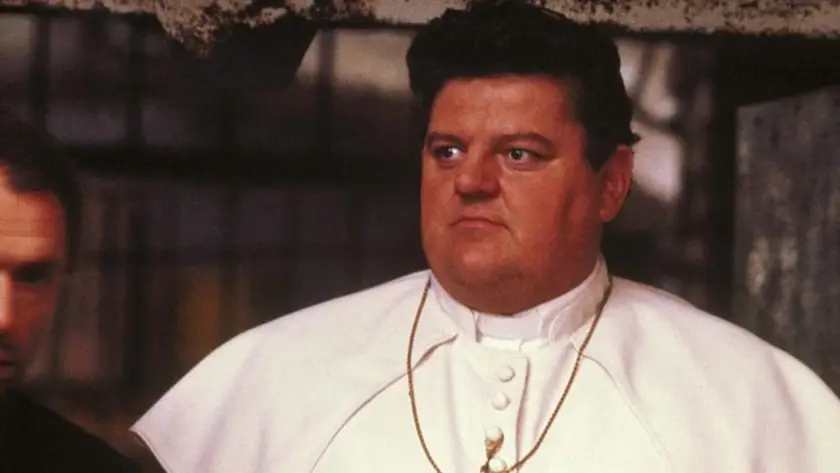
With a title that might very well announce its humour tone, The Pope Must Die is a British comedy directed by Peter Richardson. Much like other films in this list, this movie starts with the death of the late Pope, which is naturally followed by a conclave. But here is where things change, as the Mafia gets involved to get their favoured candidate elected: Cardinal Albinizi, who will later become Pope David I (Robbie Coltrane). This film proved to be very controversial when it came out, due to its sensitive subject matter, which led to significant difficulties in its promotion and distribution. For example, in the United Kingdom, London Transport refused to advertise it if the posters were not censored. In the United States, NCB, CBS, and ABC – the three biggest television networks at the time – considered it sacrilegious and offensive, refusing to show advertisements for it on their channels.
8. The Godfather: Part III (1990)
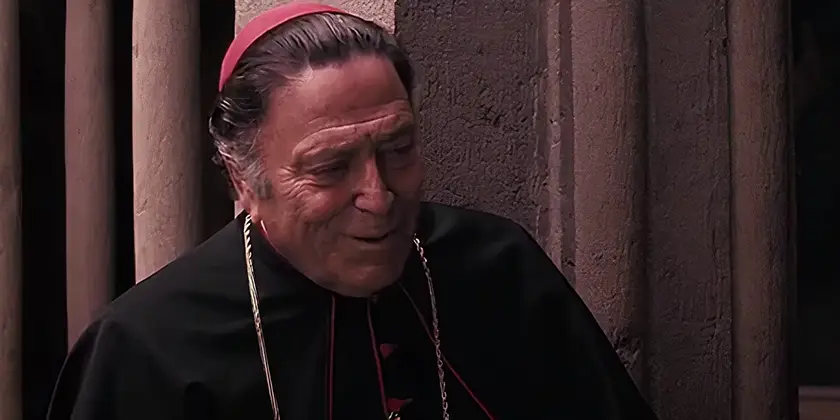
Admittedly, the Pope may not be one of the main characters in the Godfather movies, but he does feature prominently in The Godfather Part III, more so than in the rest of the series. Directed by Francis Ford Coppola, the latest chapter of the beloved and iconic film saga is set in Italy in 1978. Not only does the film feature a Pope, but also a newly elected one, as the new Pope, John Paul I, is chosen during the course of the movie. In this film, Raf Vallone plays Cardinal Lamberto, who will soon become the new Pope. Scheming, corrupted, and definitely after his own financial gain, the Pope – and the Vatican as a whole – is not portrayed very favourably in this instance.
9. Pope Joan (1972)
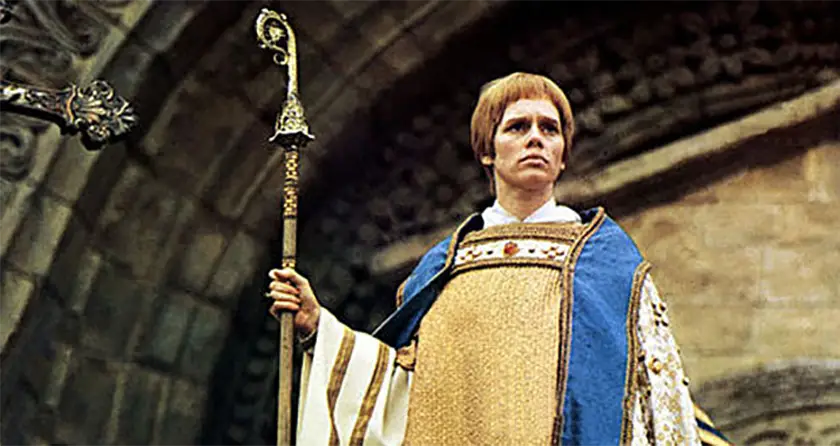
While many others on this list are examples of fictional stories about real-life historical figures, Pope Joan – the protagonist of the film by the same name – is entirely legendary and imaginary. It may seem unthinkable today, but what if it were a woman who sat on the Papal throne and held the highest seat in the Vatican, in the Middle Ages, no less? That is the question that Pope Joan poses and intends to answer as the titular main character, played by Liv Ullmann, disguises herself as a monk and travels to Rome, where she will eventually be elected Pope. It is a fascinating premise, but one we most likely won’t see come true in the coming weeks as the cardinals reunite in the Vatican to choose the newest Pope.
10. The Shoes of the Fisherman (1968)
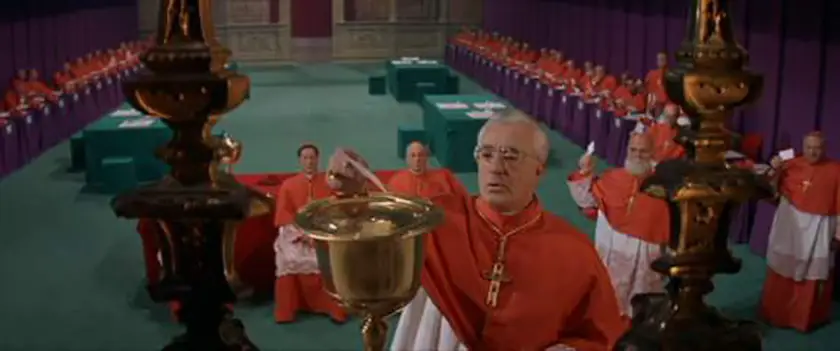
Based on a novel by the same name, The Shoes of the Fisherman is a 1968 epic political drama directed by Michael Anderson. After Archbishop Kiril Pavlovich (Anthony Quinn) is released from his imprisonment in the Soviet Union, he travels to the Vatican to join the papal conclave and ends up being elected himself, much to everybody’s surprise. The film shares a key similarity with the most recent movie on this list, the critically acclaimed and award-winning Conclave, as two of the few movies that portray a papal conclave on the big screen. Much like the 2024 movie, this also features an exploration of the internal politics that surround the election of a new Pope and the Vatican at large, but this time in the historical context of the Cold War.
From comedies to political thrillers, and with war films in the midst as well, the depiction of the Holy Father in films is often varied and different. However, one thing remains true: this figure has always attracted attention and fascination from the general public. Perhaps unsurprisingly, it seems clear that the Catholic Church – and, therefore, its highest representative – is also not necessarily seen in a positive light. As the living symbol of the Catholic Church, the Pope in cinema often embodies all the internal secrets and corruption that can be associated with the Vatican as a whole.

